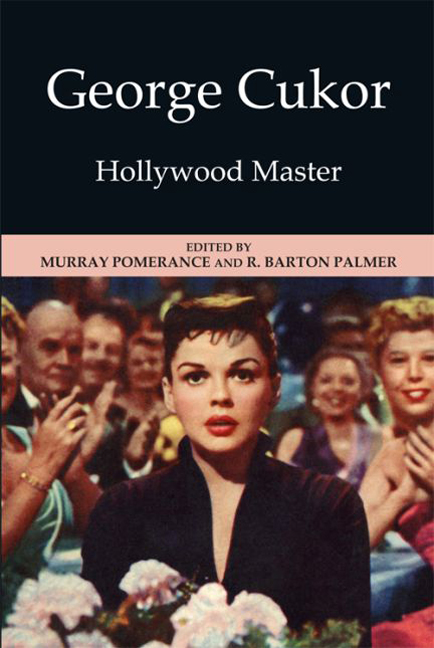Book contents
- Frontmatter
- Contents
- List of Figures
- List of Contributors
- Acknowledgments
- Introduction
- 1 Cukor's Tragicomedies of Marriage: Dinner at Eight, No More Ladies, The Women, and The Marrying Kind
- 2 George Cukor's Late Style: Justine, Travels With My Aunt, and Rich and Famous
- 3 Libel, Scandal, and Bad Big Names: It Should Happen to You, Les Girls, Camille, and Romeo and Juliet
- 4 The Cukor “Problem”: David Copperfield, Holiday, and The Philadelphia Story
- 5 Modulations of the Shot: The Quiet Film Style of George Cukor in What Price Hollywood?, Born Yesterday, Sylvia Scarlett, and My Fair Lady
- 6 Doubling in the Cinema of George Cukor: The Royal Family of Broadway, A Bill of Divorcement, A Double Life, and Bhowani Junction
- 7 George Cukor and the Case of an Actor's Director: Hepburn and/or Tracy in Little Women, The Actress, Keeper of the Flame, Adam's Rib, and Pat and Mike
- 8 Cukor Maudit: Tarnished Lady, Girls About Town, Our Betters, Susan and God, Desire Me, Edward, My Son, The Model and the Marriage Broker, Let's Make Love, and The Chapman Report
- 9 George Cukor's Theatrical Feminism: Gaslight, Heller in Pink Tights, A Life of Her Own, and A Star is Born
- 10 The Furthest Side of Paradise: Two-Faced Woman, A Woman's Face, Hot Spell, Wild is the Wind, and Winged Victory
- Works Cited and Consulted
- Index
6 - Doubling in the Cinema of George Cukor: The Royal Family of Broadway, A Bill of Divorcement, A Double Life, and Bhowani Junction
Published online by Cambridge University Press: 07 October 2017
- Frontmatter
- Contents
- List of Figures
- List of Contributors
- Acknowledgments
- Introduction
- 1 Cukor's Tragicomedies of Marriage: Dinner at Eight, No More Ladies, The Women, and The Marrying Kind
- 2 George Cukor's Late Style: Justine, Travels With My Aunt, and Rich and Famous
- 3 Libel, Scandal, and Bad Big Names: It Should Happen to You, Les Girls, Camille, and Romeo and Juliet
- 4 The Cukor “Problem”: David Copperfield, Holiday, and The Philadelphia Story
- 5 Modulations of the Shot: The Quiet Film Style of George Cukor in What Price Hollywood?, Born Yesterday, Sylvia Scarlett, and My Fair Lady
- 6 Doubling in the Cinema of George Cukor: The Royal Family of Broadway, A Bill of Divorcement, A Double Life, and Bhowani Junction
- 7 George Cukor and the Case of an Actor's Director: Hepburn and/or Tracy in Little Women, The Actress, Keeper of the Flame, Adam's Rib, and Pat and Mike
- 8 Cukor Maudit: Tarnished Lady, Girls About Town, Our Betters, Susan and God, Desire Me, Edward, My Son, The Model and the Marriage Broker, Let's Make Love, and The Chapman Report
- 9 George Cukor's Theatrical Feminism: Gaslight, Heller in Pink Tights, A Life of Her Own, and A Star is Born
- 10 The Furthest Side of Paradise: Two-Faced Woman, A Woman's Face, Hot Spell, Wild is the Wind, and Winged Victory
- Works Cited and Consulted
- Index
Summary
Critical responses to the films of George Cukor have often focused upon polari¬ties and dichotomies held in mutual tension. In a recent article for Cineaste, for example, Christoph Huber suggests that “the genius of Cukor's way with actors, his refined treatment of performance as something that is always both real and artificial (the key treatment of his overall aesthetic) marks him as a master of the in-between” (17–18). The interplay of cinema and theater logically frames many such discussions, and indeed the historical/critical responses to the director's work reference Cukor's introduction to the medium of cinema as a dialogue coach in the late 1920s and his previous artistic training as a noted Broadway director. The fact that some of his first directorial efforts were adapted theatrical works secures even further his association with the stage, and reviewers of Cukor's earliest films often note the integrity that his theatrical background brings to his cinematic compositions (Hall, “True to the Stage”; Hall, “Clemence Dane Play”).
Another set of polarities arises in the arena of sexuality. The notion that the gay/straight dichotomy compelled Cukor to maintain discrete public and private identities also becomes the basis for queer readings that critics such as Alexander Doty analyze (Flaming Classics; “A Queer Feeling”). It is from this same polarity that the “doubling” of identity arises, becoming so pronounced that one of the major biographies of the director takes its title from the phenomenon—Patrick McGilligan's A Double Life, referencing both Cukor's sexuality and his 1947 film of the same title.
Another dynamic that informs much of the director's work, but that has received less extensive treatment in the critical literature, similarly involves this notion of a “double life,” while exploring the “otherness” associated with such a duality in relation not to the director's sexuality but in connection with the specific constructions of space, time, and perspective that occur in the individual film narratives. The critical investigation of this dynamic promises to illuminate an aspect of doubling that is no less fundamental to the director's concerns, and this chapter provides such a study through an examination of doubling in the spatial, temporal, and perspectival attributes of four Cukor films that at first glance might seem to have little in common—The Royal Family of Broadway (1930), A Bill of Divorcement (1932), A Double Life, and Bhowani Junction (1956).
- Type
- Chapter
- Information
- George CukorHollywood Master, pp. 92 - 106Publisher: Edinburgh University PressPrint publication year: 2015



